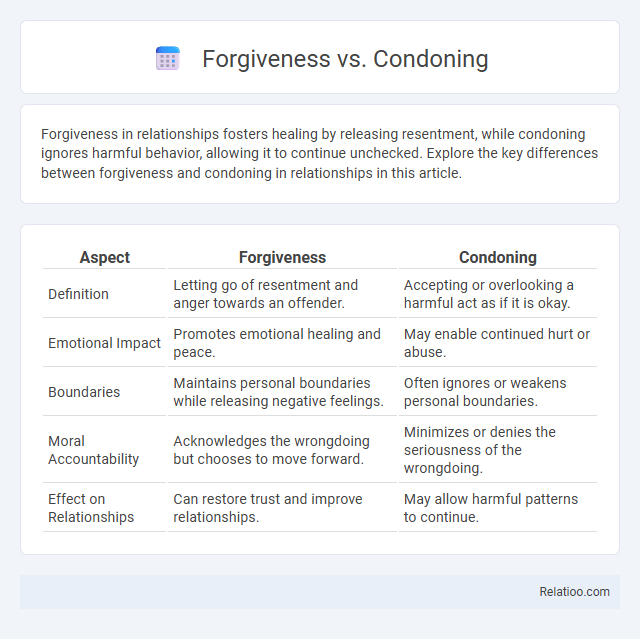Forgiveness in relationships fosters healing by releasing resentment, while condoning ignores harmful behavior, allowing it to continue unchecked. Explore the key differences between forgiveness and condoning in relationships in this article.
Table of Comparison
| Aspect | Forgiveness | Condoning |
|---|---|---|
| Definition | Letting go of resentment and anger towards an offender. | Accepting or overlooking a harmful act as if it is okay. |
| Emotional Impact | Promotes emotional healing and peace. | May enable continued hurt or abuse. |
| Boundaries | Maintains personal boundaries while releasing negative feelings. | Often ignores or weakens personal boundaries. |
| Moral Accountability | Acknowledges the wrongdoing but chooses to move forward. | Minimizes or denies the seriousness of the wrongdoing. |
| Effect on Relationships | Can restore trust and improve relationships. | May allow harmful patterns to continue. |
Understanding Forgiveness: Definition and Scope
Forgiveness involves consciously letting go of resentment or anger toward someone who has caused harm, promoting emotional healing and personal peace. Unlike condoning, which implies accepting or excusing the wrongdoing, forgiveness acknowledges the hurt without endorsing the behavior, allowing you to move forward without carrying a burden of bitterness. Non-judgement complements forgiveness by fostering an open, empathetic mindset that refrains from labeling actions as solely good or bad, enhancing emotional resilience and deeper understanding.
What Does It Mean to Condone?
To condone means to overlook or accept behavior that is morally wrong or offensive, often implying tacit approval without addressing the issue. Unlike forgiveness, which involves letting go of resentment and healing emotionally, condoning ignores the harm caused and fails to hold the wrongdoer accountable. Your understanding of condoning shapes how you respond to conflicts, influencing whether you promote healing or enable harmful patterns.
Key Differences between Forgiveness and Condoning
Forgiveness involves letting go of resentment and emotional burden without excusing the harmful behavior, whereas condoning implies accepting or approving the wrongdoing. Forgiving allows your emotional healing and peace, but condoning may reinforce negative patterns by ignoring consequences or accountability. Non-judgemented awareness supports forgiveness by promoting understanding without necessarily excusing the offense.
The Psychological Impact of Forgiveness
Forgiveness promotes emotional healing by reducing stress, anxiety, and depression, leading to improved mental well-being and resilience. Unlike condoning harmful behavior, forgiveness allows individuals to release grudges without excusing the offense, fostering psychological freedom and empathy. Non-judgement complements forgiveness by encouraging acceptance and reducing self-critical thoughts, enhancing overall emotional balance and interpersonal relationships.
Risks and Consequences of Condoning Wrongdoing
Condoning wrongdoing can lead to enabling harmful behavior, eroding trust, and fostering a toxic environment that negatively impacts your mental well-being and relationships. Unlike forgiveness, which involves releasing resentment while acknowledging the offense, condoning ignores accountability and may perpetuate injustice or harm. Non-judgment promotes understanding without excusing harmful actions, helping you maintain boundaries without compromising your values or safety.
Forgiveness Without Condoning: Is It Possible?
Forgiveness without condoning harmful behavior is possible by separating the act of letting go of resentment from approving the wrongdoing. You can choose to forgive to release personal burden while maintaining clear boundaries and accountability. This approach fosters healing and growth, ensuring justice and self-respect remain intact.
Why Forgiveness Matters in Healing
Forgiveness plays a crucial role in healing by releasing emotional burdens and promoting mental well-being, unlike condoning, which implies approval of harmful actions, or non-judgement, which involves acceptance without evaluation. Forgiveness empowers individuals to move beyond pain and resentment, fostering inner peace and resilience. Scientific studies link forgiveness to reduced stress, lower anxiety, and improved heart health, highlighting its importance in holistic recovery.
Cultural Perspectives on Forgiveness vs Condoning
Cultural perspectives on forgiveness often distinguish it from condoning harmful behavior by emphasizing restoration and emotional release rather than excusing wrongdoing. Many societies see forgiveness as a vital process for social harmony, while avoiding condoning is crucial to uphold justice and accountability. Non-judgment in these cultures encourages empathy and understanding, fostering reconciliation without compromising moral standards.
Common Misconceptions about Forgiveness and Condoning
Forgiveness is often misconceived as condoning harmful behavior or excusing wrongdoing, whereas it actually involves releasing resentment without approving the act. Condoning implies acceptance or approval of the behavior, which forgiveness distinctly does not entail. Non-judgement supports emotional detachment from negative feelings but differs from forgiveness by not necessarily addressing the underlying hurt or reconciliation.
Practical Steps to Forgive Without Condoning
Forgiving without condoning requires clear boundaries and acknowledgment of the harm done, separating the act from acceptance of wrongful behavior. Practical steps include expressing emotions honestly, seeking understanding through empathetic dialogue, and committing to personal healing without excusing or minimizing the offense. This approach fosters emotional release and restoration while maintaining accountability and discouraging repeated harm.

Infographic: Forgiveness vs Condoning
 relatioo.com
relatioo.com